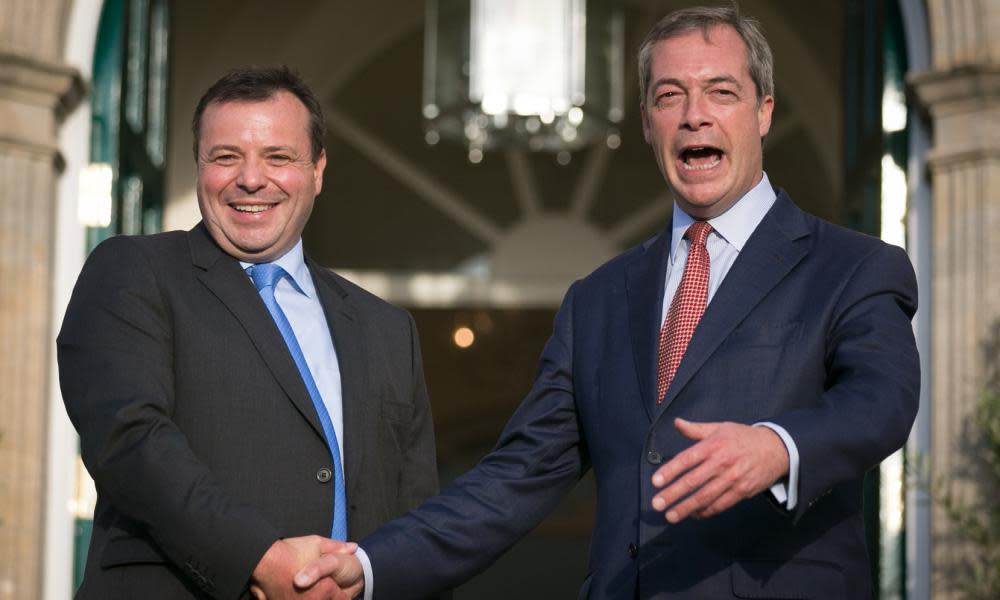Don’t wish for a new party to end the Brexit mess. It will be a far-right one

Is this the moment for a brave new party in Britain? Speculation has been building for a while, and now, noting that they have mashed politics into a sort of primordial ooze, some politicians are starting to wonder what might clamber out of it. Last week, the Liberal Democrat leader, Vince Cable, missed a key Brexit vote because he was in secret talks about how his party might assist a new one – claimed the Sunday Times (although he’s denied this). “I can’t see [how] the present system can be kept going”, he said. “In the new year, new groups may emerge.”
He may well be right. But evolution is an unpredictable thing, and the new group might not quite take the form he was thinking of. Here’s a clue: according to a You Gov/Times poll, the appetite in this country is not for a Lib Dem-friendly, centrist party, but a hard-right party of Brexit – something that appealed to 38% of those asked. Even more striking, perhaps, was the 24% who would like to see a far-right, explicitly anti-immigrant and anti-Islam party.
There are more signs for those who have been watching. Reports that Arron Banks and Nigel Farage are planning a new rightwing movement, and then reports that former Trump strategist Steve Bannon is involved in a similar-sounding venture in Europe, for which he may be planning to raise millions. Last weekend, a rally in Whitehall summoned a vast crowd of rightwingers from a hodgepodge of groups – online provocateurs, British Trump supporters and Free Tommy Robinson activists – all converging under a single ideology. If the people want a new rightwing party, you can be sure there are those equipped to give them one.
We’ve been complacent about the far right, we Brits, until now. We’ve seen Ukip’s display of fruitcakes rise and then fall again, and think that maybe that was it. We imagine perhaps that the English – unlike the Germans, the Italians, the French and the Americans – are too restrained and sensible (something to do with queueing?) to be whipped into a proper rightwing movement. We hope that Ukip – like the EDL, like Britain First – reached a sort of Kristall-ceiling, beyond which no movement would go. But we have been naive.
Britain’s far right groups have not been successful because they have not been very good. They haven’t been well organised, or well financed, or able to get through important meetings without punching each other in the head. Ukip’s journey of late has not only been one of failure but one of utter unforced cretinism. Here’s what has happened since the referendum. Nigel Farage’s favoured successor, Steven Woolfe, submitted his nomination 17 minutes too late to qualify for the leadership election. The party’s next idea, Paul Nuttall, ruined his campaign by falsely claiming to have known victims of the Hillsborough disaster, and by the fact that Ukip had forgotten to make proper records of where its voters lived. In the local elections last year Ukip’s Essex election agent submitted the paperwork 10 minutes too late, meaning the party had no candidates on the ballot paper. In the national elections it omitted to test its main slogan, “Britain Together”, on focus groups.
In other words, Ukip is a very British pro-Britain party. A smart successor would be in the sleek European mould. It would also have a persuasive message to use. Ukip’s problem was that it had one aim – Brexit – which to its great surprise, it achieved. “We were the turkeys that voted for Christmas,” Farage said last year. That mistake will not be made again. Now he has something else to say. “If the trust the people put in the democratic process … is betrayed then prepare for the backlash.” “If Brexit is seen to be betrayed”, he said on his LBC show on Sunday, “there will be a backlash the likes of which the political classes in this country simply can not understand.” This will be the founding principle of any new rightwing party.
It is likely to work. All indications suggest that whatever kind of Brexit we get, it won’t make life better for those who voted for it. (Even optimistic Brexiteers, such as Jacob Rees-Mogg, are now putting dividends at around the 50-year mark). The secret to the leave campaign’s success was offering the disenfranchised someone to blame for their troubles. A new rightwing party can say they’ve been tricked out of this hard-won justice. And if there’s one thing more compelling than telling people they have been done over, it’s telling them they’ve been done over twice. You can imagine the betrayals expanding like Russian dolls, each begetting the next. A new rightwing party surges to victory on promises to cut links with Europe further, and to place stricter control on its migrants. It does so, the economy suffers, and in response a new party emerges, further to the right, telling people the solution is to cut immigration even more. Betrayal has always been a safe bet for politicians with an eye to their own survival. It is not so safe for a country.
• Martha Gill is a freelance political journalist and former lobby correspondent

 Yahoo News
Yahoo News 
